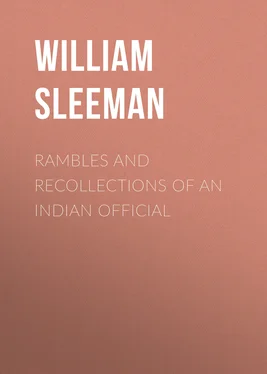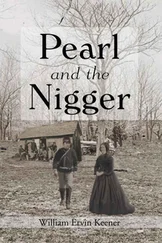William Sleeman - Rambles and Recollections of an Indian Official
Здесь есть возможность читать онлайн «William Sleeman - Rambles and Recollections of an Indian Official» — ознакомительный отрывок электронной книги совершенно бесплатно, а после прочтения отрывка купить полную версию. В некоторых случаях можно слушать аудио, скачать через торрент в формате fb2 и присутствует краткое содержание. Жанр: Путешествия и география, История, foreign_edu, foreign_antique, foreign_prose, на английском языке. Описание произведения, (предисловие) а так же отзывы посетителей доступны на портале библиотеки ЛибКат.
- Название:Rambles and Recollections of an Indian Official
- Автор:
- Жанр:
- Год:неизвестен
- ISBN:нет данных
- Рейтинг книги:4 / 5. Голосов: 1
-
Избранное:Добавить в избранное
- Отзывы:
-
Ваша оценка:
- 80
- 1
- 2
- 3
- 4
- 5
Rambles and Recollections of an Indian Official: краткое содержание, описание и аннотация
Предлагаем к чтению аннотацию, описание, краткое содержание или предисловие (зависит от того, что написал сам автор книги «Rambles and Recollections of an Indian Official»). Если вы не нашли необходимую информацию о книге — напишите в комментариях, мы постараемся отыскать её.
Rambles and Recollections of an Indian Official — читать онлайн ознакомительный отрывок
Ниже представлен текст книги, разбитый по страницам. Система сохранения места последней прочитанной страницы, позволяет с удобством читать онлайн бесплатно книгу «Rambles and Recollections of an Indian Official», без необходимости каждый раз заново искать на чём Вы остановились. Поставьте закладку, и сможете в любой момент перейти на страницу, на которой закончили чтение.
Интервал:
Закладка:
Takht Singh, the younger brother of Arjun Singh, the Rājā of Shāhgarh, 225came out several miles to meet me on his elephant. Finding me on horseback, he got off from his elephant, and mounted his horse, and we rode on till we met the Rājā himself, about a mile from our tents. He was on horseback, with a large and splendidly dressed train of followers, all mounted on fine sleek horses, bred in the Rājā's own stables. He was mounted on a snow-white steed of his own breeding (and I have rarely seen a finer animal), and dressed in a light suit of silver brocade made to represent the scales of steel armour, surmounted by a gold turban. Takht Singh was more plainly dressed, but is a much finer and more intelligent-looking man. Having escorted us to our tents, they took their leave, and returned to their own, which were pitched on a rising ground on the other side of a small stream, half a mile distant. Takht Singh resides here in a very pretty fortified castle on an eminence. It is a square building, with a round bastion at each corner, and one on each face, rising into towers above the walls.
A little after midday the Rājā and his brother came to pay us a visit; and about four o'clock I went to return it, accompanied by Lieutenant Thomas. As usual, he had a nautch (dance) upon carpets, spread upon the sward under awnings in front of the pavilion in which we were received. While the women were dancing and singing, a very fine panther was brought in to be shown to us. He had been caught, full-grown, two years before, and, in the hands of a skilful man, was fit for the chase in six months. It was a very beautiful animal, but, for the sake of the sport, kept wretchedly thin. 226He seemed especially indifferent to the crowd and the music, but could not bear to see the woman whirling about in the dance with her red mantle floating in the breeze; and, whenever his head was turned towards her, he cropped his ears. She at last, in play, swept close by him, and with open mouth he attempted to spring upon her, but was pulled back by the keeper. She gave a shriek, and nearly fell upon her back in fright.
The Rājā is a man of no parts or character, and, his expenditure being beyond his income, he is killing his goose for the sake of her eggs—that is, he is ruining all the farmers and cultivators of his large estate by exactions, and thereby throwing immense tracts of fine land out of tillage. He was the heir to the fortress and territory of Garhā Kotā, near Sāgar, which was taken by Sindhia's army, under the command of Jean Baptiste Filose, 227just before our conquest in 1817. I was then with my regiment, which was commanded by Colonel, afterwards Major- General, G–, 228a very singular character. When our surgeon. Dr. E–, received the newspaper announcing the capture of Garhā Kotā in Central India by Jean-Baptiste , an officer of the corps was with him, who called on the colonel on his way home, and mentioned this as a bit of news. As soon as this officer had left him, the colonel wrote off a note to the doctor: 'My dear Doctor,—I understand that that fellow, John the Baptist , has got into Sindhia's service, and now commands an army—do send me the newspapers.' These were certainly the words of his note, and, at the only time I heard him speak on the subject of religion he discomfited his adversary in an argument at the mess by 'Why, sir, you do not suppose that I believe in those fellows, Luther, Calvin, and John the Baptist, do you?'
Nothing could stand this argument. All the party burst into a laugh, which the old gentleman took for an unequivocal recognition of his victory, and his adversary was silenced. He was an old man when I first became acquainted with him. I put into his hands, when in camp, Miss Edgeworth's novels, in the hope of being able to induce him to read by degrees; and I have frequently seen the tears stealing down over his furrowed cheeks, as he sat pondering over her pages in the corner of his tent. A braver soldier never lived than old G–; and he distinguished himself greatly in the command of his regiment, under Lord Lake, at the battle of Laswāri 229and siege of Bharatpur. 230It was impossible ever to persuade him that the characters and incidents of these novels were the mere creations of fancy—he felt them to be true—he wished them to be true, and he would have them to be true. We were not very anxious to undeceive him, as the illusion gave him pleasure and did him good. Bolingbroke says, after an ancient author, 'History is philosophy teaching by example.' 231With equal truth may we say that fiction, like that of Maria Edgeworth, is philosophy teaching by emotion. It certainly taught old G– to be a better man, to leave much of the little evil he had been in the habit of doing, and to do much of the good he had been accustomed to leave undone.
CHAPTER 18
On the 6th 232we came to Sayyidpur, ten miles, over an undulating country, with a fine soil of decomposed basalt, reposing upon syenite, with veins of feldspar and quartz. Cultivation partial, and very bad; and population extremely scanty. We passed close to a village, in which the children were all at play; while upon the bushes over their heads were suspended an immense number of the beautiful nests of the sagacious 'bayā' bird, or Indian yellow- hammer, 233all within reach of a grown-up boy, and one so near the road that a grown-up man might actually look into it as he passed along, and could hardly help shaking it. It cannot fail to strike a European as singular to see so many birds' nests, situated close to a village, remain unmolested within reach of so many boisterous children, with their little proprietors and families fluttering and chirping among them with as great a feeling of security and gaiety of heart as the children themselves enjoy.
In any part of Europe not a nest of such a colony could have lived an hour within reach of such a population; for the bayā bird has no peculiar respect paid to it by the people here, like the wren and robin-redbreast in England. No boy in India has the slightest wish to molest birds in their nests; it enters not into their pastimes, and they have no feeling of pride or pleasure in it. With us it is different—to discover birds' nests is one of the first modes in which a boy exercises his powers, and displays his love of art. Upon his skill in finding them he is willing to rest his first claim to superior sagacity and enterprise. His trophies are his string of eggs; and the eggs most prized among them are those of the nests that are discovered with most difficulty, and attained with most danger. The same feeling of desire to display their skill and enterprise in search after birds' nests in early life renders the youth of England the enemy almost of the whole animal creation throughout their after career. The boy prides himself on his dexterity in throwing a stone or a stick; and he practises on almost every animal that comes in his way, till he never sees one without the desire to knock it down, or at least to hit it; and, if it is lawful to do so, he feels it to be a most serious misfortune not to have a stone within his reach at the time. As he grows up, he prides himself upon his dexterity in shooting, and he never sees a member of the feathered tribe within shot, without a desire to shoot it, or without regretting that he has not a gun in his hand to shoot it. That he is not entirely destitute of sympathy, however, with the animals he maims for his amusement is sufficiently manifest from his anxiety to put them out of pain the moment he gets them.
A friend of mine, now no more, Captain Medwin, was once looking with me at a beautiful landscape painting through a glass. At last he put aside the glass, saying: 'You may say what you like, S—, but the best landscape I know is a fine black partridge 234falling before my Joe Manton.'
Читать дальшеИнтервал:
Закладка:
Похожие книги на «Rambles and Recollections of an Indian Official»
Представляем Вашему вниманию похожие книги на «Rambles and Recollections of an Indian Official» списком для выбора. Мы отобрали схожую по названию и смыслу литературу в надежде предоставить читателям больше вариантов отыскать новые, интересные, ещё непрочитанные произведения.
Обсуждение, отзывы о книге «Rambles and Recollections of an Indian Official» и просто собственные мнения читателей. Оставьте ваши комментарии, напишите, что Вы думаете о произведении, его смысле или главных героях. Укажите что конкретно понравилось, а что нет, и почему Вы так считаете.












